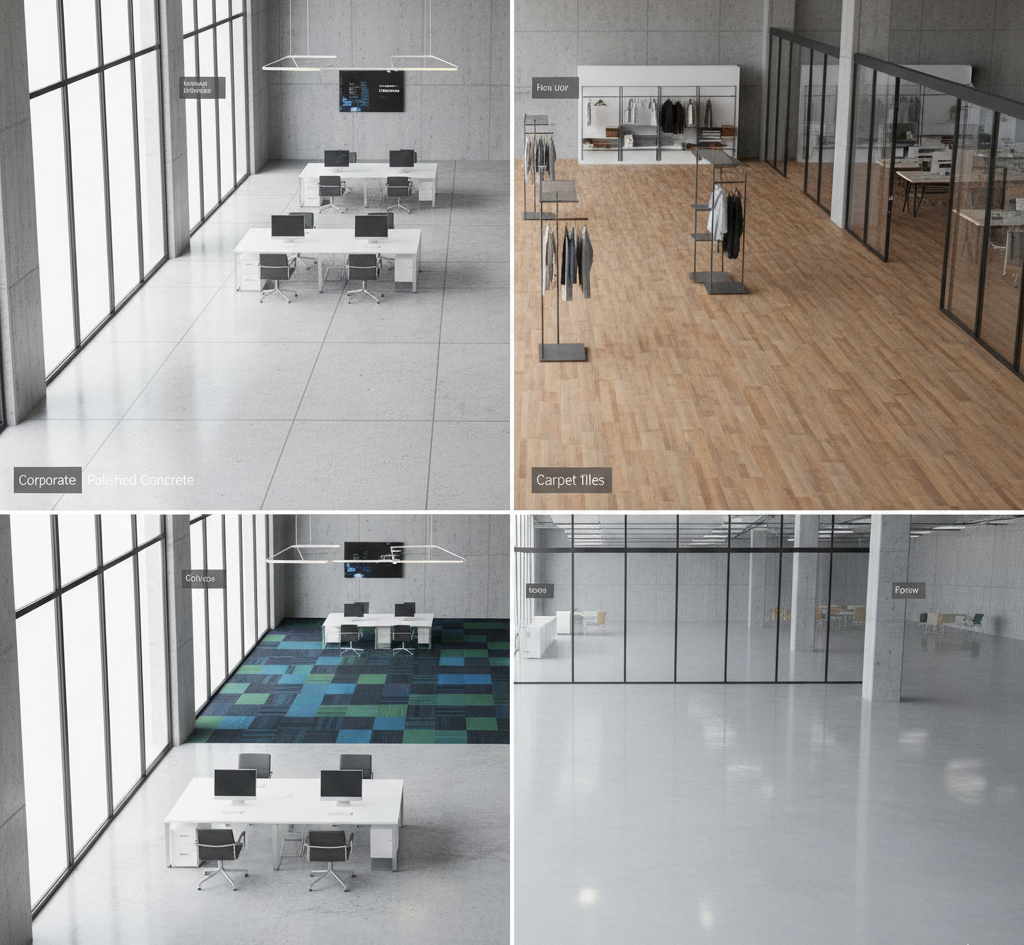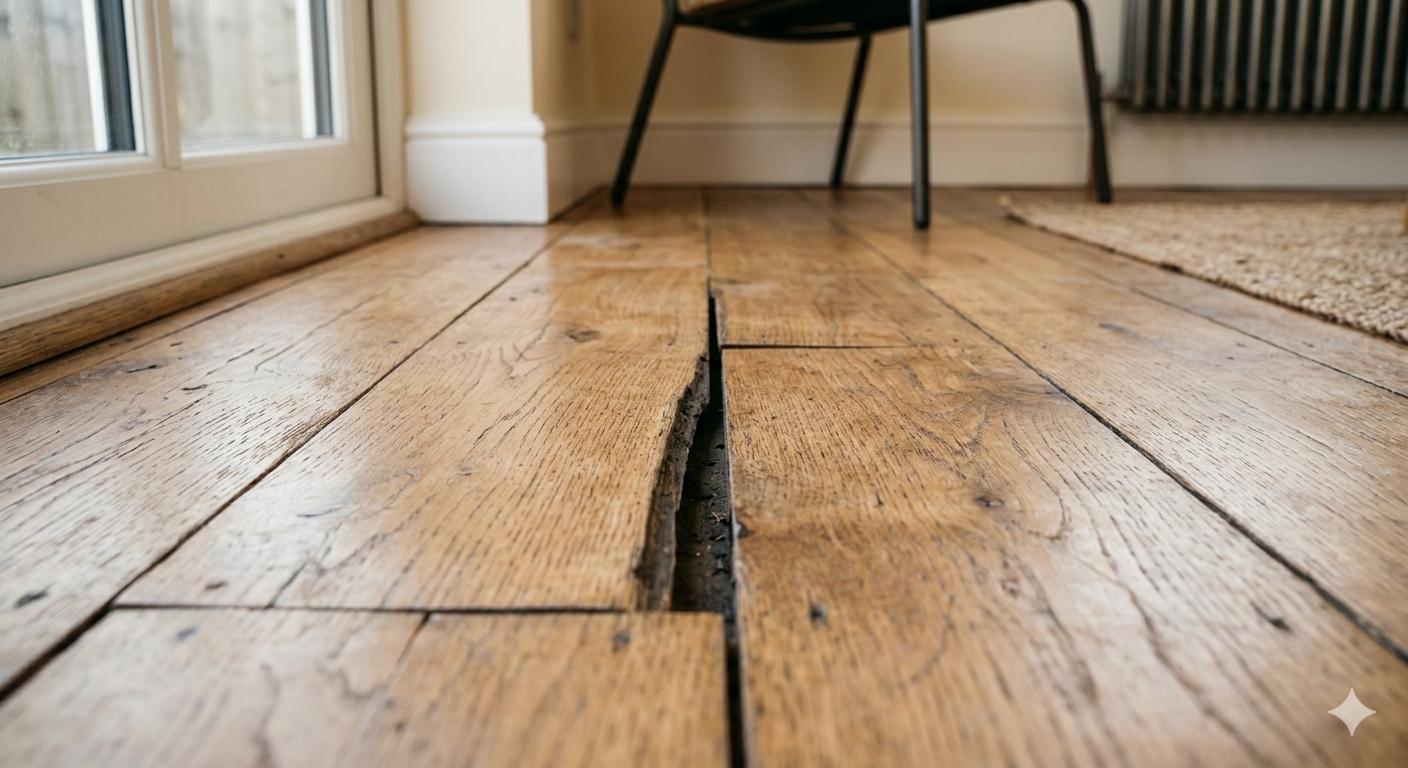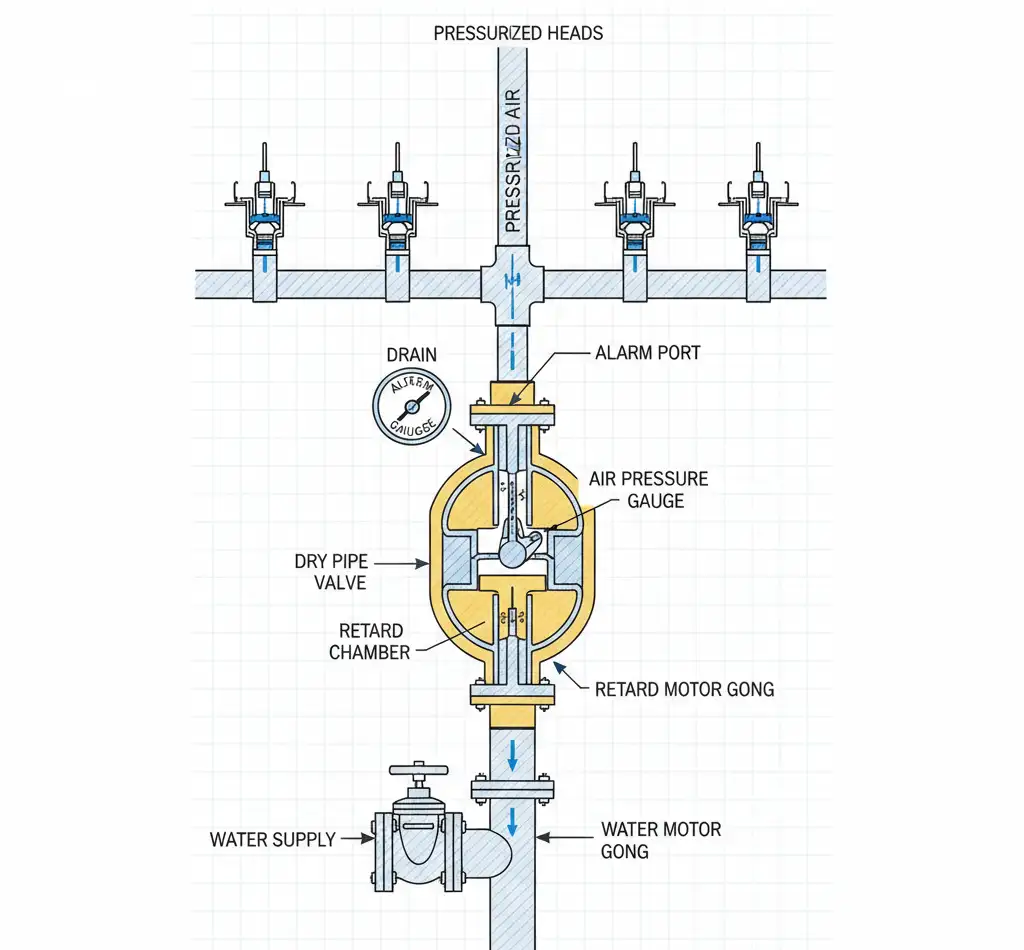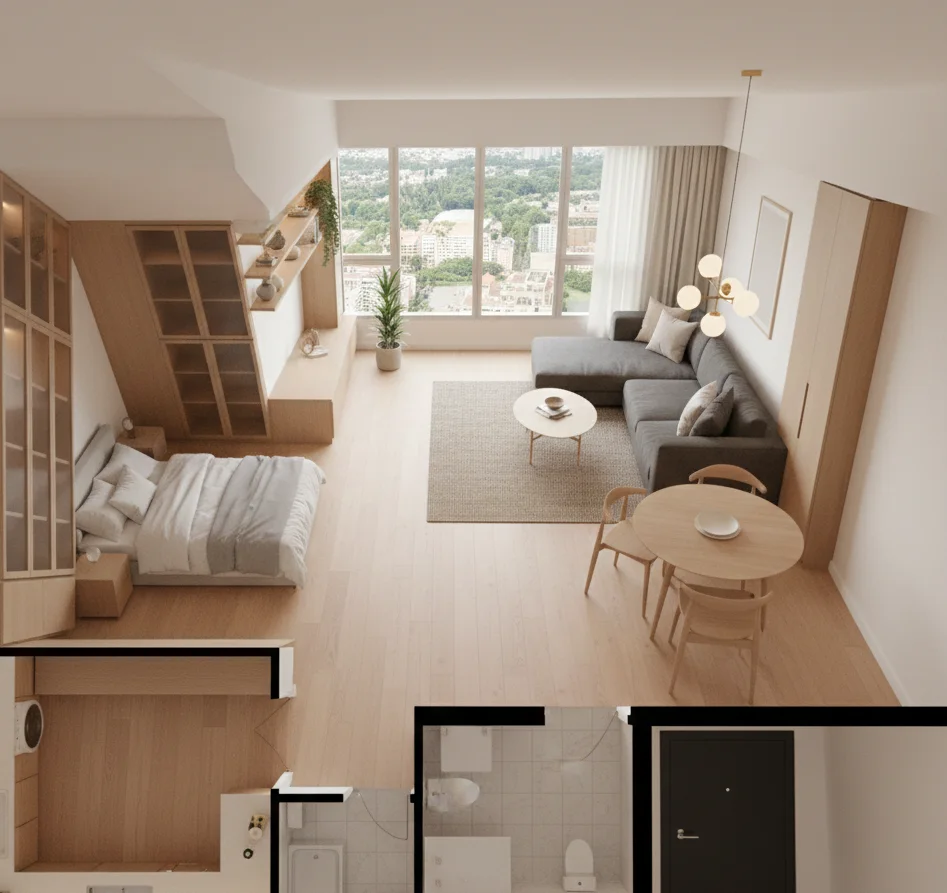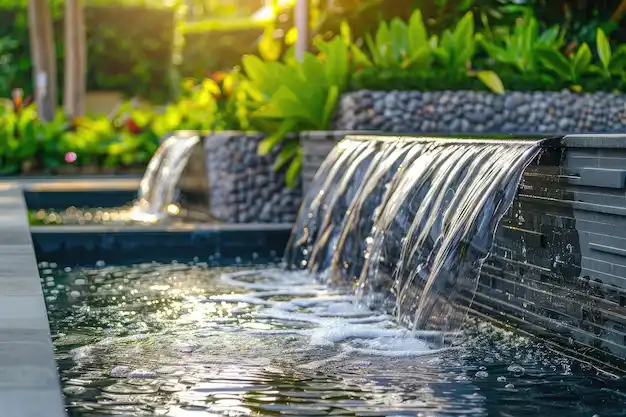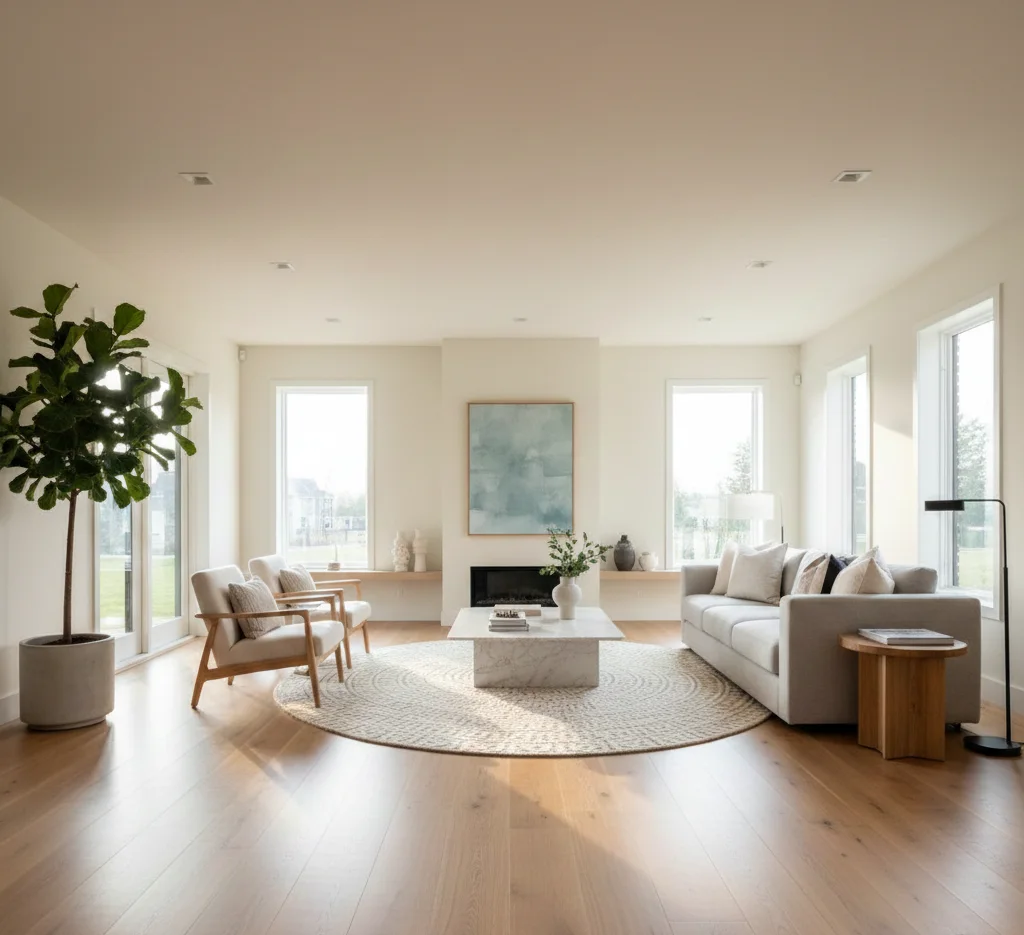Your business floor is more than a floor it is a vital part of your workspace that affects safety, aesthetics, productivity overall operational efficiency. Pick the right Commercial Flooring is crucial to ensure that it is durable, easy to maintain, and looks professional to impress your client and your employee. High traffic office space, industrial warehouse, or retail space, your flooring needs to withstand the daily wear and tear while supporting your design aesthetic.
Equally important understanding how to care for and maintain your floors. Commercial Floor Repair service address scratches, dents, and other damage that could shorten the life of your flooring investment and increase costs over time. This guide, in part, will inform your choices regarding flooring materials, preventative maintenance and care, as well as repair options where needed, allowing you to make educated and informed decisions that protect the safety and effectiveness of your workplace.
Why Choosing the Correct Commercial Flooring
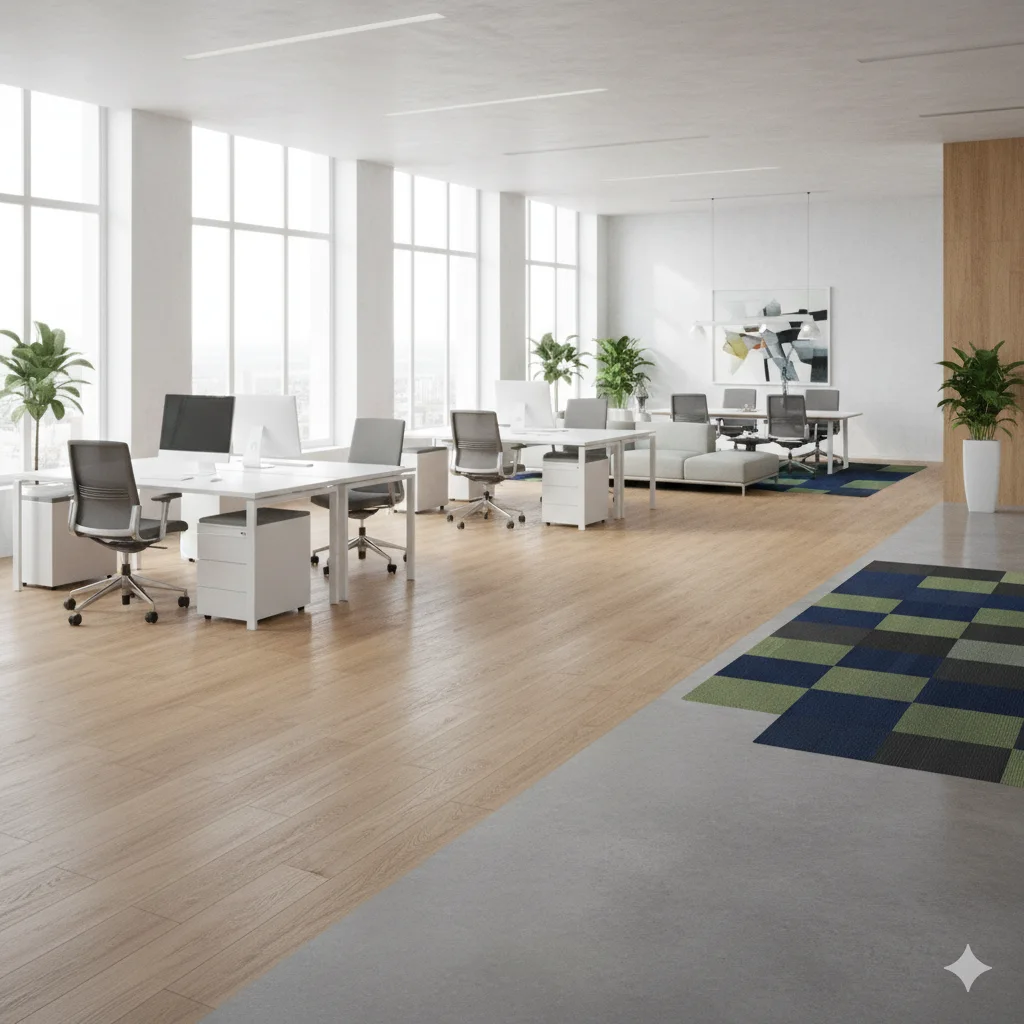
Choosing the optimum commercial flooring is much more than an aesthetic decision, it’s a tactical decision that can directly affect the functionality, safety, and image of your business. Your flooring needs to perform well with the specific demands of your space whether that’s heavy foot traffic in an office, heavy equipment in a warehouse, or spills and stains in a restaurant or healthcare facility.
The proper flooring contributes to safety by being slip resistant, which reduces accidents at work and provides ergonomic comfort to employees who are standing for an extended time. Safety and comfort also assists to promote aesthetics, which helps to create a professional and inviting presentation space that communicates your brand and makes a positive, lasting impression on clients and visitors.
Durability and maintenance are key consideration as well. Invest in high-quality commercial flooring reduce long term repair and replacement cost, save time on upkeep, ensure consistent performance under daily wear and tear. Additionally, eco-friendly and sustainable flooring option can align with corporate responsibility goal and enhance your company reputation.
In short, the right flooring is a combination of durability, safety, design, and cost-efficiency—making it a critical business decision that supports productivity, employee satisfaction, and customer experience.
Commercial Flooring is constructed for durability. Choosing the right type of for your setting is the first step in limiting maintenance costs and prolonging floor life.
Top Durable Commercial Flooring Options

Here are some of the most popular and high-performing choices for high-traffic commercial settings:
Luxury Vinyl Tile (LVT) & Plank (LVP):
Luxury Vinyl Tile (LVT) and Luxury Vinyl Plank (LVP) are some of the most versatile and resilient flooring material available today. These products represent premium looks with functional durability for a multitude of commercial applications. LVT and LVP are exceptionally moisture, stain and scuff resistant making them an excellent choice for high-traffic areas that demand durability.
The luxury in LVT and LVP is that they mimic the look of high-end natural materials –such as hardwood, stone or ceramic tile -at less than half the cost and at a significantly lower maintenance obligation to uphold their performance. LVT and LVP are popular choices with businesses in healthcare, retail, corporate offices and hospitality – because they have a professional look and feel but can sustain everyday wear and tear. LVT & LVP are simple to install and allow for modular replacements of damaged sections making overall downtime lower and affordable in the long run.
Epoxy Flooring Systems:
Epoxy flooring system design for spaces where durability and performance are paramount. Often found in industrial settings, warehouses, garages, commercial kitchens, epoxy coatings seamlessly blend into a highly durable surface placed directly onto concrete slabs. Having excellent resistance to chemical, abrasion, and heavy machinery, epoxy floor are well suited for environments where safety and cleanliness are crucial.
The non-porous nature of the surface prevents the absorption of liquids, which limits stains and minimizes the growth of bacteria, an important feature for food services and medical settings. In addition to its durability and safety features, epoxy flooring systems can have further customization in color and design patterns, which also can have anti-slip components. With the combination of durability, longevity and design, throughout a value added service, epoxy flooring will provide either a performance flooring solution or stylish commercial investment long-term.
Carpet Tiles:
Carpet tiles are an advantageous and fashionable flooring option for corporate offices, educational facilities, and areas where noise reduction is important. As opposed to broadloom carpet, carpet tiles are modular which allow for the simple replacement of individual tiles if soiled, damaged or worn, proving advantageous for prevailing maintenance costs over time.
Furthermore, carpet tiles are great sound absorbers – mitigating excessive noise pollution in busy office space, classrooms, and conference spaces. Also, carpet tile come in an entire color, pattern, texture line, allowing businesses to create custom designs that accommodate branding or interior décor. Additionally, their ease of installation and flexibility is another suitable option for commercial spaces that need to be adaptive and efficient but still be comfortable in appearance and quality.
Polished Concrete:
Polished concrete has become a popular choice for contemporary commercial spaces because of its stylish look, durability, and affordability . It take advantage of existing concrete slab, eliminates the additional expense of an alternative floor finish, saving on installation time and cost. Polished concrete floors are incredibly resilient and can withstand wear, stains, foot traffic, making them ideal for retail businesses, open floor plans, showrooms, and even industrial applications.
Polished concrete is durable and environmentally friendly because the surface requires little cleaning promote energy efficiency by minimizing natural light requirements and using recycled aggregates or high reflective finishes. The polished, glossy surface of concrete assists in illuminating commercial spaces creating brighter and more welcoming areas, while the neutral aesthetic of polished concrete fits a variety of design styles, including minimal modern or contemporary industrial.
Choosing your material based on factors like required slip resistance, moisture exposure, and traffic volume will ensure your initial investment pays dividends for years.
The Inevitable: When to Use Commercial Floor Repair
Regardless of how tough your choice is, it can become worn and torn. After damage occurs, in the event you ignore it despite the minor damage, you may then suffer greater structural concerns, costly downtime, and even a safety hazard. The process of Prompt Commercial Floor Repair is a preventative maintenance effort to protect your investment.
Common Issues Requiring Repair
Cracks and Potholes in Concrete: Most important, especially in industrial environments, it creates trip hazards, forklifts damage, and loss of structural integrity. The repair often requires specialist epoxy or cementitious patching compounds.
Worn Wear Layers on LVT/Vinyl: High traffic can dull the protective top layer. A professional repair will involve deep cleaning and minor patchwork before applying a new finish. This will restore gloss and protection to the LVT floor surface.
Loose or Broken Tiles/Planks: Any loose piece for any type of flooring is a trip hazard… whether ceramic, quarry, or LVT. If it’s not snapped back in place, it’s best to replace it quickly to prevent water from getting beneath the subfloor or to make it more difficult to in the future.
Grout Damage: Damage grout on tile floors will trap dirt, bacteria, eventually will cause tiles to lift. Repairing and re-sealing grout is important for hygiene and stability.
Repair vs. Replacement: Making the Call
The decision between a spot repair and full floor replacement often comes down to the extent of the damage.
| Scenario | Recommendation |
| Localized Damage (Small cracks, a few worn tiles) | Commercial Floor Repair is the clear choice. It’s faster, less disruptive, and more cost-effective |
| Widespread Failure (Extensive water damage, major subfloor issues, total wear across the area) | Full Replacement may be necessary. Repeated, extensive repairs often cost more in the long run than a fresh installation. |
professional flooring contractor can assess the damage and provide an unbiased recommendation, balancing cost, required downtime, and longevity.
Thoughts on Proactive Floor Management
The performance of your Commercial Flooring is directly connect to the success of your business operation. Selecting high quality, fit-for-purpose materials, and implementing a proactive maintenance and timely Commercial Floor Repair schedule will help keep your facility safe, attractive, and operating efficiently for decades. Do not wait for a small crack to become a major liability—even a small crack can take down the flooring in your facility—take ownership to protect your floor and your business.

